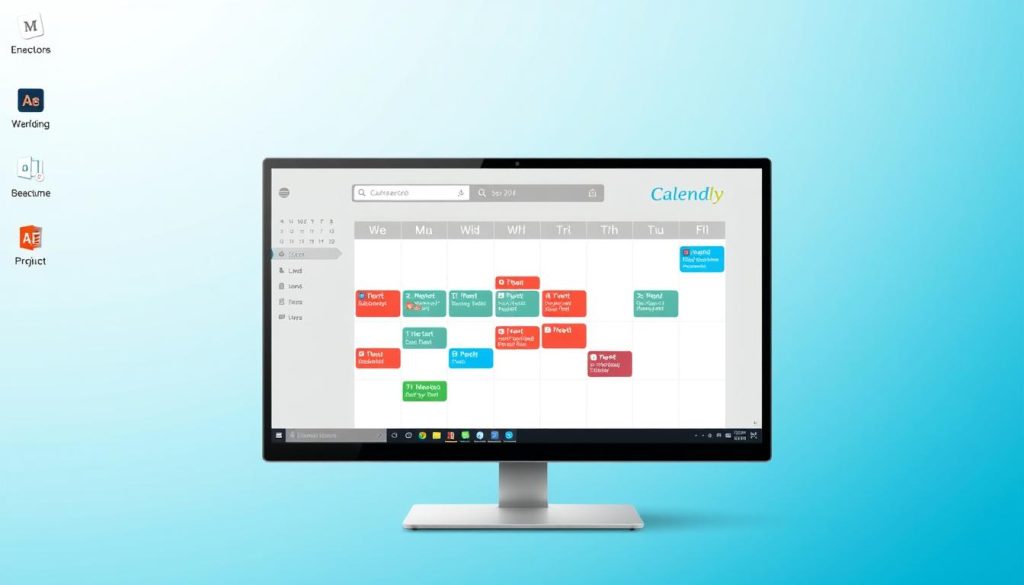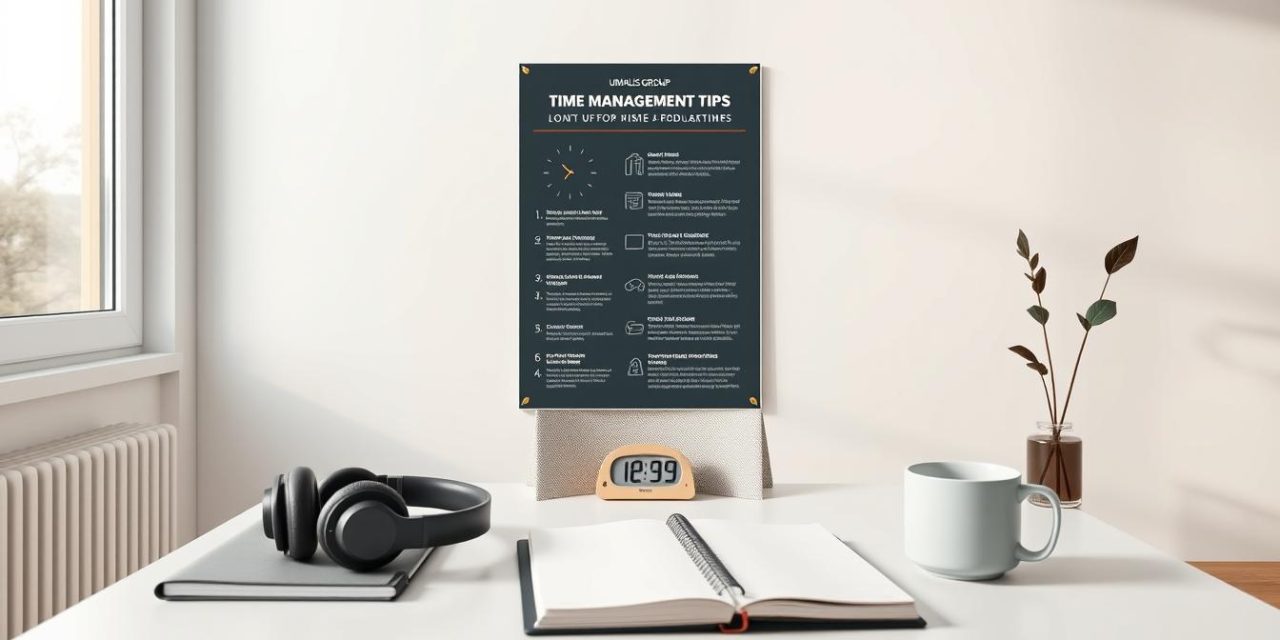As an independent professional, managing your time effectively is crucial for achieving a healthy work-life balance and driving business growth. Without the structure of a traditional employment setting, it’s easy to get bogged down in administrative tasks, client work, and business development, leading to stress and decreased productivity.
Good time management can lead to a more balanced lifestyle, enabling you to prioritize what’s important, accomplish more in less time, and boost your confidence. In this comprehensive guide, we’ll explore practical strategies tailored to help freelancers and consultants optimize their productivity and achieve their business goals.
Table of Contents
Key Takeaways
- Understand the importance of effective time management for independent professionals.
- Learn how to assess your current time usage and identify areas for improvement.
- Discover practical strategies for implementing effective time management systems.
- Create sustainable productivity habits that support your business goals.
- Maximize your billable hours and improve work-life balance.
Understanding the Value of Time Management for Independent Professionals
Effective time management is crucial for independent professionals to achieve success. At its core, time management involves the basic skills of awareness, arrangement, and adaptation. This means being mindful of your time, structuring it, and adjusting it as you go, which is the secret to effective time management.
Executives now point to behavioral skills as the most important for the modern workforce, with « time management skills and the ability to prioritize » ranking second in IBM’s skills gap survey. For independent professionals, time management goes beyond simple scheduling—it’s about strategically allocating your most valuable and limited resource to maximize both productivity and profitability.
What Is Time Management and Why It Matters
Time management is not just a personal productivity habit; it’s a critical business skill for self-employed individuals, as their time directly correlates to income. Understanding the value of time management requires recognizing that not all hours are equal—identifying your most productive periods and highest-value activities is essential for business growth.
The Impact of Poor Time Management on Your Business
Independent professionals who fail to manage their time effectively often experience scope creep on projects, missed deadlines, and difficulty scaling their business beyond a certain point. Poor time management can lead to working longer hours without corresponding increases in revenue, creating a cycle of burnout and diminishing returns on effort.
| Consequences of Poor Time Management | Impact on Business |
|---|---|
| Scope Creep | Projects extend beyond initial plans |
| Missed Deadlines | Damages client trust and reputation |
| Burnout | Decreases productivity and increases stress |
For more insights on optimizing your time management skills, you can read our article on leadership and time management.
The Benefits of Mastering Time Management Skills
Mastering time management skills is essential for independent professionals to enhance their productivity, reduce stress, and improve their overall work-life balance. By effectively managing their time, professionals can prioritize tasks, focus on high-value activities, and make strategic decisions that contribute to business growth.
Increased Productivity and Business Growth
Effective time management enables independent professionals to increase their productivity, taking on more clients without compromising quality or personal wellbeing. By prioritizing tasks and focusing on high-value activities, professionals can drive revenue generation and business development, laying a foundation for sustainable business growth.
Reduced Stress and Improved Work-Life Balance
Implementing strong time management systems can significantly reduce stress levels, as professionals gain confidence in their ability to meet deadlines and handle workload fluctuations. This leads to an improved work-life balance, enabling professionals to create clear boundaries between work and personal time without guilt or anxiety.
Enhanced Focus and Decision-Making
Proper time management enhances focus, resulting in higher quality work, fewer errors, and greater client satisfaction. It also enables professionals to make strategic decisions, evaluating opportunities based on their alignment with business goals rather than immediate time pressures.
- Mastering time management skills allows for sustainable business growth.
- Effective management of time reduces stress and improves work-life balance.
- Time management enhances focus and leads to better decision-making.
Assessing Your Current Time Usage

Assessing your current time usage is a crucial step towards becoming a more efficient independent professional. By understanding how you spend your time, you can identify areas for improvement and optimize your daily tasks to achieve better time management.
Conducting a Time Audit
Conducting a thorough time audit is essential for any independent professional seeking to improve their time management skills. This involves tracking all professional activities over at least one full week, noting tasks performed, interruptions, transitions between activities, and energy levels throughout the day. A comprehensive time audit helps in understanding how much time is spent on various tasks and identifying patterns that may be hindering productivity.
Identifying Time Wasters and Productivity Gaps
Many independent professionals are surprised to discover significant productivity gaps in their workday upon conducting a time audit. Common time wasters include excessive email checking, unstructured social media use, and impromptu client calls. By identifying these gaps and time wasters, professionals can create targeted strategies to address specific productivity challenges and enhance their overall work efficiency.
After completing a time audit, you can use the data to establish baseline metrics for improvement and create a plan to optimize your daily schedule, ensuring that your time is spent on tasks that align with your business priorities and revenue-generating activities.
Essential Time Management Tips for Independent Professionals
Independent professionals face unique time management challenges that require strategic solutions. Effective time management is not just about getting more done in less time; it’s about making the right decisions on how to allocate your time to maximize productivity and achieve your business goals.
Setting Clear Priorities Using the Eisenhower Matrix
The Eisenhower Matrix is a powerful tool for prioritizing tasks based on their urgency and importance. By categorizing tasks into four quadrants—important and urgent, important but not urgent, urgent but not important, and not important or urgent—you can focus on the tasks that truly drive your business forward. Tasks that are both urgent and important should be your top priority, as they typically have significant consequences if not completed on time.
| Quadrant | Task Type | Action |
|---|---|---|
| 1 | Important and Urgent | Do |
| 2 | Important but Not Urgent | Defer |
| 3 | Urgent but Not Important | Delegate |
| 4 | Not Important or Urgent | Delete |
Creating Effective To-Do Lists That Actually Work
Creating an effective to-do list involves more than just listing tasks. It requires structuring your list to include context, estimated time requirements, dependencies, and clear success criteria. By doing so, you can create a roadmap for your day that is both realistic and achievable. This approach helps in avoiding the pitfall of overcommitting and underdelivering.
Learning to Say No and Delegate When Necessary
Learning to say « no » to low-value opportunities is crucial for maintaining focus on high-priority tasks. Similarly, delegating tasks when possible can significantly increase the time available for billable work. Delegation is not about losing control but about leveraging your resources effectively to achieve your business objectives.
By implementing these time management tips, independent professionals can not only enhance their productivity but also create a better work-life balance. Regular review and adjustment of priorities are key to ensuring that your time management strategy remains aligned with your evolving business needs.
Powerful Time Management Strategies to Implement Today

Implementing powerful time management strategies can revolutionize the way independent professionals work. By adopting effective techniques, professionals can enhance their productivity, reduce stress, and achieve a better work-life balance.
The Pomodoro Technique for Focused Work Sessions
The Pomodoro Technique, developed by Francesco Cirillo, is a simple yet effective method to boost productivity. It involves working in focused 25-minute intervals (called « Pomodoros ») separated by 5-minute breaks. After four cycles, a longer break of 15-30 minutes is taken. This technique helps in maintaining concentration and reducing mental fatigue, especially for tasks that are open-ended or require extensive research.
Benefits of the Pomodoro Technique: It provides a structured approach to work, combats procrastination, and enhances overall productivity by breaking down work into manageable intervals.
Timeboxing: Allocating Specific Time Slots for Tasks
Timeboxing is a strategy where specific, limited time slots are allocated for tasks. This approach creates a sense of urgency and prevents work from expanding to fill the available time. By scheduling tasks within fixed time frames, independent professionals can prioritize their work more effectively and avoid overcommitting.
Effective timeboxing can significantly improve task management by ensuring that each task gets a dedicated time slot, thus enhancing overall productivity.
Batching Similar Tasks to Reduce Context Switching
Task batching involves grouping similar tasks together and completing them in one session. This strategy is particularly beneficial for independent professionals handling multiple client projects, as it minimizes the productivity loss associated with context switching between different types of work.
By batching similar tasks, professionals can reduce the cognitive load associated with switching between tasks, thereby improving the quality and efficiency of their work.
These time management strategies can be implemented immediately without requiring special tools or extensive preparation. They offer a practical and accessible way for independent professionals to enhance their productivity and work quality.
Creating an Environment That Enhances Productivity
Optimizing your workspace is a critical step in enhancing your productivity and managing your time more efficiently. As an independent professional, your work environment plays a crucial role in determining your ability to focus and stay productive throughout the day.
Designing Your Ideal Workspace
Designing an ideal workspace involves considering several factors, including ergonomics, lighting, acoustics, and personal preferences. A well-designed workspace can help reduce physical strain and support sustained concentration. For instance, a clutter-free desk can significantly improve your ability to focus. Take a few minutes to organize your workspace by throwing away unnecessary papers, stacking books neatly, and coiling stray wires.
Minimizing Distractions in Your Work Environment
Independent professionals often face unique challenges in managing distractions, particularly when working from home or shared spaces. Digital distractions, such as notifications and social media, can be significant productivity killers. Implementing systems to manage these distractions, such as turning off notifications or using website blockers, can help you stay focused. Additionally, setting clear boundaries with family members and clients about your work hours and availability can also help minimize distractions.
Leveraging Technology for Better Time Management
In today’s fast-paced world, independent professionals need to harness the power of technology to optimize their time management. By leveraging the right tools and applications, you can streamline your workflow, reduce administrative tasks, and focus on high-priority tasks.
Time Tracking and Project Management Tools
Effective project management is crucial for independent professionals. Tools like Toggl and Harvest help track billable hours with precision, while project management tools like Asana and Trello enable you to coordinate cross-functional work, track progress, and meet deadlines.
![]()
Calendar and Scheduling Applications
Calendar and scheduling applications like Calendly and ScheduleOnce allow clients to book appointments within predefined availability windows, eliminating the back-and-forth of appointment setting. This not only saves time but also improves client satisfaction.

Focus Apps and Digital Distraction Blockers
In today’s digitally distracted world, focus apps like Freedom and StayFocusd have become essential tools for many independent professionals. These apps create technological barriers to interruptions during deep work sessions, helping you stay focused and productive.

By combining these specialized tools and apps with seamless integration, you can create a robust time management system that enhances your productivity and profitability.
Balancing Productivity with Self-Care
Achieving a balance between productivity and self-care is crucial for independent professionals to maintain their overall well-being. It’s a common misconception that constant work leads to higher productivity, but in reality, our brains need time to rest and recharge to function optimally.
The Importance of Breaks and Rest
Strategic breaks throughout the workday are essential for effective time management. They allow the brain to process information and maintain high performance levels. According to our research, 32% of knowledge workers who feel burnout report not being able to switch off or disconnect, which fuels their burnout. Sustainable productivity requires balancing focused work periods with intentional rest.
- Balancing work and rest helps prevent burnout.
- Independent professionals lack external structures that regulate work hours.
- Micro-breaks throughout the workday can enhance productivity.
Rewarding Yourself for Completed Tasks
Creating a reward system for completed tasks is a powerful motivator. It leverages behavioral psychology principles to maintain motivation and prevent burnout during intensive work periods. Many successful independent professionals incorporate structured self-care activities into their schedules, recognizing that personal well-being directly impacts professional performance.
Conclusion: Implementing Your Personalized Time Management System
With various time management techniques at your disposal, the key lies in creating a strategy that aligns with your goals and lifestyle. To achieve this, consider your long- and short-term objectives, ensuring they are SMART: specific, measurable, attainable, relevant, and timely.
Effective time management for independent professionals isn’t about adopting a one-size-fits-all approach, but rather creating a personalized system that suits your unique work style and business goals. Start by implementing one or two time management tips or strategies, and be patient as you develop new habits.
Regularly review and refine your time management system to ensure it remains effective as your business evolves. By doing so, you’ll be able to achieve your most important goals while maintaining wellbeing and satisfaction in your independent career.
FAQ
How can I effectively prioritize tasks as an independent professional?
To prioritize tasks effectively, use the Eisenhower Matrix to categorize tasks into urgent vs. important and focus on the most critical ones first. This helps you allocate your productivity hours wisely and achieve your goals.
What are some common distractions that hinder my productivity, and how can I minimize them?
Common distractions include social media, email notifications, and chatty colleagues or family members. To minimize them, consider using focus apps or digital distraction blockers, and create a conducive workspace that promotes focus.
How can I maintain a healthy work-life balance as an independent professional?
To achieve a healthy work-life balance, establish a routine that includes breaks and self-care activities. Set clear boundaries between your work and personal life by allocating specific schedules for work and leisure.
What are some effective strategies for managing multiple projects simultaneously?
To manage multiple projects, use project management tools to track progress and deadlines. Prioritize tasks across projects using the Eisenhower Matrix, and allocate specific time slots for each project using timeboxing.
How can I avoid procrastination and stay motivated as an independent professional?
To avoid procrastination, break down large tasks into smaller, manageable chunks, and reward yourself for completing tasks. Use the Pomodoro Technique to work in focused intervals, and maintain a schedule to stay on track.
What are some essential tools for effective time management?
Essential tools include calendar and scheduling applications, time tracking software, and focus apps. These tools help you stay organized, prioritize tasks, and maintain productivity.





